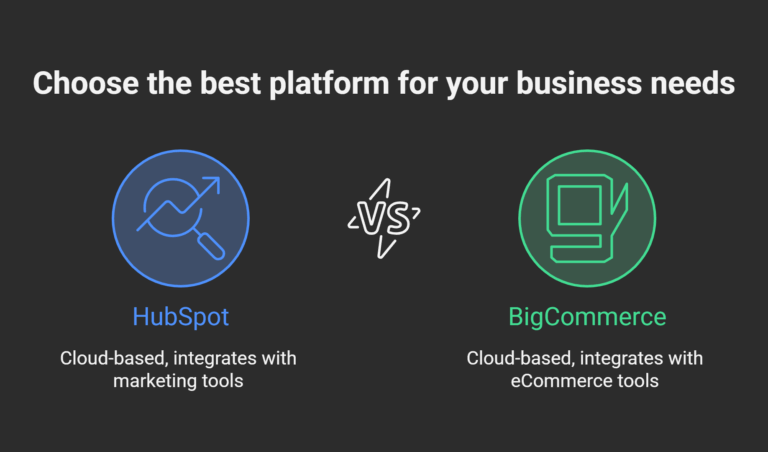Why HubSpot vs BigCommerce: Which Platform Suits You Better?
Choosing the right platform can make or break your business digital growth. When comparing why HubSpot vs BigCommerce matters, you’re not just looking at features, you’re evaluating how each supports your marketing, sales and eCommerce goals.
If you’re planning to build a unified digital experience, check out our guide on HubSpot BigCommerce integrations.
Understanding the Core Difference: HubSpot vs BigCommerce
Before diving into why HubSpot vs BigCommerce better suits different businesses, it’s essential to understand what each platform is designed for:
What is HubSpot?
HubSpot is an all-in-one CRM platform offering marketing, sales, customer service and content management tools. It is known for its automation, personalization and centralized data.
What is BigCommerce?
BigCommerce is a powerful eCommerce platform primarily focused on helping businesses sell online. It offers a variety of out-of-the-box eCommerce features and is designed to scale with growing product catalogs and customer bases.
Why HubSpot vs BigCommerce Better Fits Specific Business Goals
1. Purpose and Use Case
-
HubSpot is ideal for businesses focused on inbound marketing, sales automation, lead nurturing and long-term customer relationships.
-
BigCommerce is more suited for product-based companies that prioritize eCommerce features like product listings, shopping carts and payment gateways.
2. Marketing Capabilities
-
HubSpot excels in lead generation, automated email marketing, SEO and social media tracking.
-
BigCommerce supports basic marketing but lacks the depth of automation and personalization that HubSpot offers.
Verdict: HubSpot gives you more control over nurturing the buyer journey, which is essential for B2B and service-based models.
Why HubSpot vs BigCommerce Are the Same in Some Areas
1. Cloud-Based and Easy to Use
Both platforms are cloud-based, require no installation and are designed with user-friendly dashboards.
2. Integration Possibilities
HubSpot and BigCommerce integrate with hundreds of third-party tools, including each other. For example, syncing BigCommerce with HubSpot helps unify eCommerce data with marketing workflows.
3. Customer Support
Both platforms offer extensive knowledge bases, email support and onboarding resources.

Key Reasons to Choose HubSpot Over BigCommerce
1. Inbound Marketing Automation
HubSpot drag-and-drop workflows and behavior-based triggers let you automate lead nurturing, which BigCommerce lacks natively.
2. CRM-Centric Architecture
HubSpot was built around a CRM-first approach. It aligns your marketing, sales and service teams in one dashboard. To access this level of functionality, BigCommerce depends on external CRM integrations.
3. Advanced Reporting and Analytics
HubSpot attribution reporting, funnel visualization and customer journey mapping go beyond BigCommerce standard analytics dashboard.
4. Content and Lead Management
With HubSpot, you can manage blogs, landing pages, forms and CTAs with personalized content at every touchpoint. BigCommerce is more product and category focused.

When to Choose BigCommerce Over HubSpot
eCommerce-Centric Business Model
If your business revolves around physical or digital product sales, BigCommerce offers better native eCommerce functionalities like SKU management, inventory tracking and payment integrations.
Budget Constraints for CRM/Marketing
BigCommerce can be a more affordable option if you only need a shopping cart and basic marketing tools without complex workflows.
Why You Might Use Both Together
Many businesses combine the strengths of both platforms. BigCommerce handles the storefront while HubSpot manages the backend CRM, email marketing and customer retention strategies.
Example:
-
Use BigCommerce for product listings, checkout and inventory.
-
Use HubSpot for abandoned cart workflows, lead nurturing and lifecycle marketing.
Cost Comparison – HubSpot vs BigCommerce
| Feature |
HubSpot |
BigCommerce |
| Primary Use |
CRM, Marketing, Sales, Service |
eCommerce Platform |
| Pricing |
Starts Free, Premium Plans Vary |
Starts ~$29.95/month |
| Customization |
Advanced workflows, emails and reports |
Themes, product categories, payment tools |
| CRM Included |
Yes |
No (requires integration) |
| eCommerce Features |
Limited (via integration) |
Full suite out-of-the-box |
Conclusion
The decision isn’t about which platform is universally better, it’s about what your business needs today and where you’re headed tomorrow.
-
Choose HubSpot if you want a CRM-powered, marketing-first experience with deep automation and personalization.
-
Choose BigCommerce if your core revenue comes from online product sales and you need native eCommerce functionalities.
Or combine both platforms for a comprehensive digital experience.
FAQs
1. Is HubSpot better than BigCommerce for marketing?
Yes. HubSpot offers more advanced marketing automation, CRM and analytics tools than BigCommerce.
2. Can HubSpot and BigCommerce be integrated?
Absolutely. HubSpot and BigCommerce integrate via APIs or middleware like Zapier to connect your CRM and eCommerce workflows.
3. Why HubSpot vs BigCommerce is a strategic decision?
Because each platform serves different goals: HubSpot focuses on marketing and CRM; BigCommerce specializes in online selling.
4. Is HubSpot good for eCommerce?
HubSpot isn’t an eCommerce platform but it enhances eCommerce performance when integrated with tools like BigCommerce or Shopify.
5. What’s the main difference between HubSpot and BigCommerce?
HubSpot serves as a CRM and marketing platform, whereas BigCommerce centers around product-based eCommerce. They serve complementary functions.
Relevant Guide
Does Service HubSpot Service Hub Integrate with Service Now?
HubSpot Food and Beverage Clients – Transforming the Industry with Integration
How Many Emails Can I Send with HubSpot? A Complete Guide from a HubSpot Consultant
HubSpot BigCommerce Integration Services
HubSpot Salesforce Integration Services
Circle.so HubSpot Integration Services
 HubSpot Consulting Needs
HubSpot Consulting Needs  Custom Automation Plan
Custom Automation Plan 







